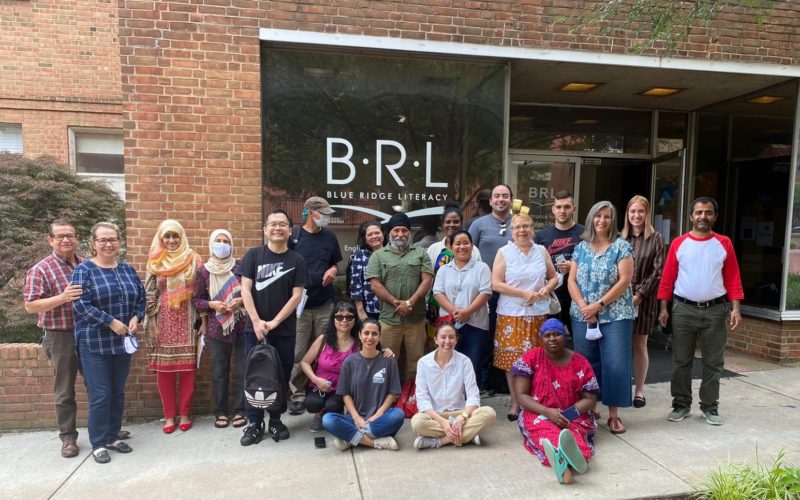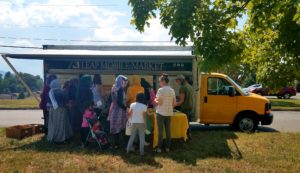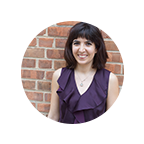Cross-Sectional Literacy Services: A Collaborative Approach to Provision of Functional Literacy Skills

by Ahoo Salem, Ph.D.
Since 2019, Blue Ridge Literacy has been increasingly working towards utilizing its various community partnerships to provide cross-sectional literacy services and address adult learners’ informational gaps.
Located in the City of Roanoke in southwest Virginia, Blue Ridge Literacy Blue Ridge Literacy (BRL) was established in 1985 to address the basic literacy needs of American-born adults in the area. By the 1990’s the organization added English as a second language (ESOL) programs to its services to address the English literacy needs of Roanoke’s growing immigrant and refugee population. Currently, over 90% of BRL’s learners are foreign-born adults seeking to improve their English literacy skills. BRL’s services focus on functional literacy and aim to provide learners with the practical skills needed to read, write, and communicate real-life purposes to ensure adult learners can navigate everyday life situations and make informed long-term plans. BRL’s focus on functional literacy aligns well with the City of Roanoke’s 2040 Comprehensive Plan focusing on interwoven equity and the city’s vision of becoming a diverse and inclusive community with access and opportunities available to all.

As an organization, BRL is an active participant in ongoing initiatives and programs in the city of Roanoke and works closely with community partners from a range of fields, including but not limited to the city public libraries, city schools, food access programs, institutions of higher education focusing on health care, and the city’s Financial Empowerment Center. A question we frequently receive from our community partners revolves around the needs of adult ESOL learners. There is, however, no easy way to answer this question. Similar to any adult education program, BRL students have a variety of educational backgrounds, skillsets, English proficiency levels, and differential levels of access to resources. Looking through the lens of functional literacy, BRL learners have a wide range of needs when it comes to navigating everyday settings, starting from differential levels of information about available resources.
Since 2019, Blue Ridge Literacy has been increasingly working towards utilizing its various community partnerships to provide cross-sectional literacy services and address adult learners’ informational gaps. This approach aims to connect representatives among the service providers with BRL learners through guest lectures or as classroom assistants. Each visit revolves around a specific topic that BRL’s instructors and learners cover as part of the class curriculum. BRL classes are viewed as safe and trusted spaces by our learners. When community partners join our classes as classroom assistants or guest presenters, they have the opportunity to become familiar with the linguistic and cultural diversity of our learners. At the same time, adult learners can interact with representatives of various services they use directly and share their questions and concerns in an environment of structured learning. The provision of cross-sectional literacy services is a work in progress and serves as a framework for creating BRL’s new programs. The following examples focusing on health literacy and food access show the diversity of these partnerships and the benefits of such an approach.
BRL’s English and health literacy program is one of our most established forms of cross-sectional services. BRL created this program in response to the English and health literacy needs of adult learners, as well as the expressed interests of medical students at Virginia Tech Carilion School of Medicine (VTCSOM) to become familiar with their future patients. Since January 2019, medical students at VTCSOM have been joining the health literacy block of our program as classroom assistants. The success of this collaboration has resulted in expressions of interest from students enrolled in the Physician Assistant program in Radford University Carilion (RUC) and the university’s Public Health program.
BRL also has a long history of working with Roanoke’s Local Environmental Agriculture Project Inc. (LEAP). This collaboration initially aimed to inform BRL’s learners about the SNAP Double Value Programs through field trips to various farmers’ market locations. These visits, in exchange, helped familiarize the farmers’ market staff about the needs of BRL’s learners as potential customers. Currently, two of LEAP’s mobile markets are held in neighborhoods that are highly populated by BRL’s ESOL learners. Adult learners, the majority of whom are women, regularly shop at these locations and share their needs and requests with the mobile market managers.
Having the ability to interact with our community partners through the cross-sectional literacy programs promotes trust-building and increases mutual respect and understanding between adult literacy learners and service providers. BRL’s vision is to expand its cross-sectional literacy services to establish additional programs focusing on English and financial literacy and English and digital literacy—and to include structured field trips and guest visits addressing the specific needs of adult learners. To realize our vision, we need to continue working with our community partners and create a dialogue about the importance of such an approach for the overall well-being of our community
 Dr. Ahoo Salem is the Executive Director of Blue Ridge Literacy (BRL), a CBLO that offers adult literacy services to foreign and native-born residents of Roanoke Valley. Ahoo is also a member of the Virginia Office of New Americans Advisory Board (ONAAB). In this role, she serves as one of the Board’s two Language Access Co-Leads and works to provide actionable recommendations addressing linguistic, cultural, and economic integration of New Americans in the Commonwealth of Virginia. As a sociologist with a passion for integration initiatives, Ahoo is especially interested in the ways in which differential access to resources shapes and impacts experiences of everyday life for immigrants in different host settings. Originally from Iran, Ahoo holds a Ph.D. in sociology from Universita Degli Studi di Milano, in Milan, Italy.
Dr. Ahoo Salem is the Executive Director of Blue Ridge Literacy (BRL), a CBLO that offers adult literacy services to foreign and native-born residents of Roanoke Valley. Ahoo is also a member of the Virginia Office of New Americans Advisory Board (ONAAB). In this role, she serves as one of the Board’s two Language Access Co-Leads and works to provide actionable recommendations addressing linguistic, cultural, and economic integration of New Americans in the Commonwealth of Virginia. As a sociologist with a passion for integration initiatives, Ahoo is especially interested in the ways in which differential access to resources shapes and impacts experiences of everyday life for immigrants in different host settings. Originally from Iran, Ahoo holds a Ph.D. in sociology from Universita Degli Studi di Milano, in Milan, Italy.